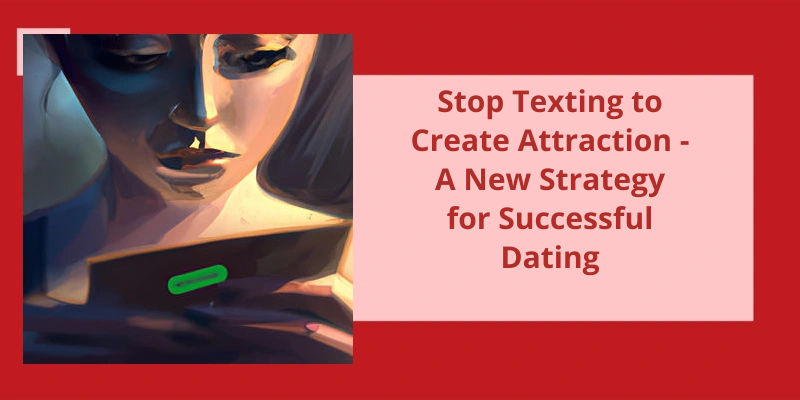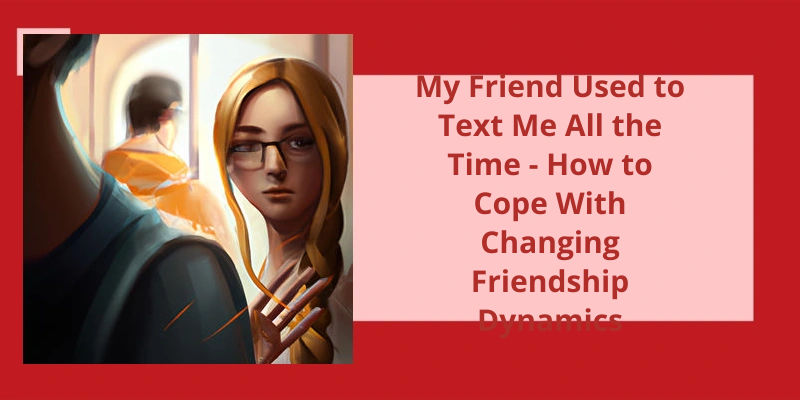In today's digital age, it’s become common practice to use technology to initiate and maintain romantic relationships. Texting has become the primary mode of communication for many people, especially in the dating world. However, recent studies have found that relying solely on texting to create attraction may have detrimental effects on the success of a relationship. While texting is an essential tool for communication, it can’t replace face-to-face interactions and emotional connections. In this article, we will explore the negative impacts of excessive texting and how to build attraction without relying solely on digital conversations. By understanding the shortcomings of texting, we can develop healthier and stronger connections with potential partners. So, it's time to put down the phone and focus on creating genuine connections that last.
Is Too Much Texting Bad for a Relationship?
Furthermore, texting can sometimes lead to misunderstandings or miscommunications as tone and inflection can’t be accurately conveyed through text messages. This can create confusion and even arguments between partners. Additionally, relying solely on texting as a means of communication can prevent couples from having meaningful face-to-face conversations and connecting on a deeper level.
Moreover, constantly checking and responding to text messages can be a distraction and disrupt concentration in important tasks or activities. In some cases, people may even start to prioritize their phones over their partners, which can be damaging to the relationship. It’s important for couples to set boundaries and establish clear communication methods that work for both parties.
Finally, it’s important to recognize that different people have different communication styles and preferences. While one person may prefer constant texting, another may prefer occasional phone calls or in-person conversations. It’s important for couples to understand and respect each others communication preferences in order to foster a healthy and fulfilling relationship.
While texting can be a convenient and easy way to communicate with a partner, excessive texting can have negative consequences in a relationship.
Instead, you can sit back and let the other person take the reins. But what happens when they don’t text you back either? This is a common predicament that many people find themselves in when they stop being the one to initiate conversations. In this article, we’ll explore the pros and cons of not texting first and what to do when the other person doesn’t text back.
What Happens When You Stop Texting First?
In a way, it can be liberating to know that you no longer have the pressure to keep up with the conversation. You can relax and wait for the other person to initiate the conversation. However, this can also affect the dynamics of the relationship. If the other person is used to you always starting the conversation, they might feel neglected or assume that you aren’t interested.
Stopping to text first can also reveal a lot about the relationship. If the other person doesn’t initiate the conversation for a long time, it might indicate that they aren’t as invested in the relationship as you are. This can be a sign that it’s time to re-evaluate the relationship and decide if it’s worth continuing.
Stopping to text first can also give you a chance to focus on other aspects of your life. It can give you more time to pursue hobbies or spend time with friends and family. It can also help you to re-evaluate your priorities and goals, allowing you to focus on things that truly matter to you.
It can provide an opportunity to relax and focus on other aspects of your life, but it can also reveal the other persons level of interest in the relationship. Ultimately, it’s up to you to decide whether to continue the relationship or move on based on the responses you receive.
The Psychological Impact of Always Being the One to Initiate Conversation in a Relationship
This topic examines the emotional effects on an individual’s wellbeing when they constantly find themselves initiating communication with their partner in a relationship. It explores how this pattern can impact self-esteem, confidence, and one’s perception of the relationship dynamics.
Now that we’ve established the potential power of texting in building attraction, it’s important to understand how to use this tool effectively. While it may seem simple on the surface, there are numerous pitfalls to avoid if you want to make a good impression and build a connection with someone through text messaging. So, let’s dive into the do’s and don’ts of building attraction over text.
Can You Build Attraction Over Text?
Building attraction over text is a skill that can be learned with practice. The key is to focus on creating an emotional connection with the person youre texting. The best way to do this is to ask open-ended questions that allow the other person to share their thoughts and feelings. Avoid yes or no questions or anything that could be answered with a single word.
Dont take yourself too seriously and don’t be afraid to use humor. Sharing funny memes or interesting articles can be a great way to start a conversation and build rapport.
It’s also important to be authentic in your texting. Dont try to be someone youre not or pretend to be interested in something that youre not just because you think it will impress the other person. Being honest and genuine is much more attractive than putting on a façade.
One common mistake people make when trying to build attraction over text is to be too aggressive or pushy. Dont try to force the other person to respond quickly or constantly bombard them with messages. It’s important to give them space and let the conversation flow naturally.
Finally, don’t forget to listen as well as talk. Pay attention to the other persons responses and use their words to keep the conversation going. By focusing on creating an emotional connection, being playful and authentic, and giving the other person space to respond, you can build attraction and generate interest over text.
Common Pitfalls to Avoid While Texting
- Avoid texting too much, especially if the other person isn’t responding.
- Avoid using excessive shorthand or abbreviations that the other person may not understand.
- Don’t send messages when you’re angry or emotional. Take a break and come back to it later.
- Don’t overshare personal information over text.
- Avoid sending the same message multiple times or continuously checking for a response.
- Avoid sending messages that could be interpreted as passive-aggressive or insulting.
- Be mindful of the other person’s boundaries and expectations for texting.
- Avoid using all caps or excessive exclamation points.
- Don’t assume the tone or meaning behind a message, clarify if necessary.
When it comes to dating, there’s a common question that pops up: “Doesn’t not texting him make him want me more?” While spacing out conversations can create attraction initially, bombarding someone with follow-up messages won’t necessarily produce the desired effect. In this article, we’ll explore the dynamics of texting in a relationship and provide insight into how to build attraction using this popular mode of communication.
Does Not Texting Him Make Him Want You More?
The age-old question of whether not texting a guy will make him want you more remains a topic of hot debate in todays dating world. While there’s no magic formula when it comes to building a healthy and meaningful relationship, it’s crucial to understand that over-texting or under-texting could have some unintended consequences.
If you consistently find yourself being the one to initiate conversations or reply to messages within seconds of receiving them, it’s time to take a step back and re-evaluate your communication strategy. While theres nothing wrong with showing interest in someone, it could come off as being too eager or clingy if the other person doesn’t reciprocate the same energy.
On the other hand, purposely avoiding texting someone, hoping that theyll miss you and reach out, might not be the best approach either. While some people might appreciate the mystery and intrigue that comes with playing hard to get, others might interpret it as a lack of interest or even being disrespectful.
One of the keys to building attraction and maintaining a healthy texting relationship is to find a balance that works for both parties involved. If youre interested in someone but don’t want to come off as too eager, try spacing out your conversations while still showing interest when you do chat. This can help build the anticipation and excitement of getting to know each other, which could lead to a stronger connection down the line.
Sending more than one follow-up message if the other person doesn’t reply right away can be detrimental to the relationship. Not only does it make you come off as desperate, but it can also annoy the other person if they don’t want to talk. Instead, if you don’t get a response after the first message, give it some time before reaching out again. And if you still don’t get a response, it might be best to take the hint and move on.
The Role of Texting in Long-Distance Relationships
Texting plays a significant role in long-distance relationships, allowing couples to stay connected and communicate throughout the day. It provides a sense of closeness and intimacy despite the distance, and can help alleviate feelings of loneliness and isolation. Texting also allows couples to share pictures, videos, and other media, making it easier to share experiences even when physically apart.
Source: Doesn’t texting a guy back make him want you more?..
Conclusion
In conclusion, it’s clear that the idea of using texting as a tool to create attraction has been overestimated for quite some time now. The reality is that genuine attraction and deep connections can only form in real-life interactions, where communication is more organic and meaningful. While texting can be a useful tool for staying in touch or expressing simple emotions, it should never be relied upon as the primary means of forging a romantic connection. Instead, individuals should focus on developing their communication skills and confidence in real-life situations, where true attraction can be naturally nurtured over time. Ultimately, the key to creating meaningful relationships lies in building trust, being confident, honest, and present in the moment, and treating others with respect and kindness.






